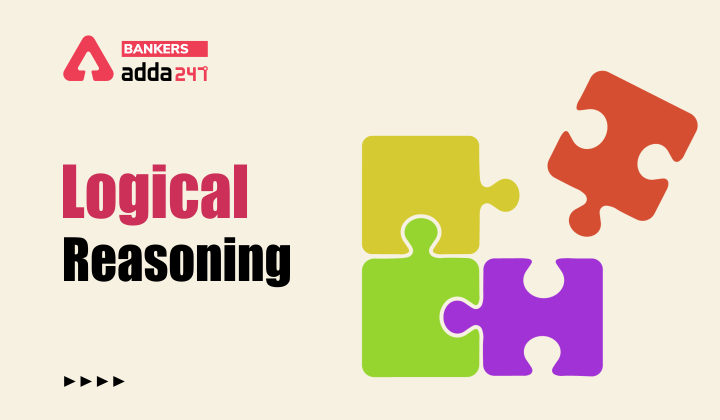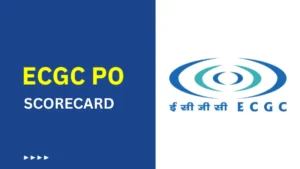Table of Contents
Logical Reasoning: Logical reasoning questions are included in the Reasoning Ability and General Intelligence section of the Government exam syllabus. Questions from this part are scoring and help in analyzing the logic-based approach of candidates. In this article, we have covered topic-wise logical reasoning questions for candidates to excel in the upcoming competitive exams and score more in the reasoning ability section. Candidates can also check some tips and tricks to solve the logical reasoning questions.
Logical Reasoning Topics
If a candidate is preparing for government recruitment exams then Logical Reasoning is one of the most important sections. Logical Reasoning section refers to the potential of a candidate to understand and then logically work through its concepts to solve the problems. Problem-solving ability of a candidate is tested through Logical Reasoning as to solve the Questions correctly a candidate need to have a logical level of analysis. This article is compiled to help the candidates prepare for the upcoming recruitment exams lined up to be held in the upcoming months.
Logical Reasoning: Definition
Aptitude-based questions come under the category of Logical Reasoning that require critical thinking and accurate analysis. Logical Reasoning refers drawing specific conclusions based on the conditions given. Two main sections of Logical Reasoning are: Verbal Reasoning and Non-Verbal Reasoning.
Verbal Reasoning
Verbal Reasoning refers to the ability to understand the concept logically and then solve the problems expressed in words. The aim of verbal reasoning is to evaluate one’s ability to think productively and not on vocabulary or fluency.
Non-Verbal Reasoning
Non-verbal Reasoning refers to the ability to understand the concept logically and then solve the problems expressed in numbers, letters, and figures along with words. Non-Verbal Reasoning includes recognizing visual sequences, identifying relationships between objects, similarities, and differences between shapes and patterns, etc.
Logical Reasoning: Topics
Logical Reasoning covers a wide variety of topics. These topics are very important as they are the scoring sections of any government recruitment exams. A candidate should cover all the topics given below to build up their section of Logical Reasoning.
| Alphanumeric series | Dices |
| Reasoning Analogies | Directions |
| Artificial Language | Data Sufficiency |
| Blood Relations | Decision Making |
| Calendar | Deductive Reasoning/Statement Analysis |
| Clocks | Embedded Images |
| Coding-Decoding | Figure Matrix |
| Cause and Effect | Input-Output |
| Cubes and Cuboids | Mirror and Water Images |
| Critical Path | Odd one out |
| Paper Folding | Fresh Casino |
| Pattern Series and Sequences | Picture Series and Sequences |
| Order & Ranking | Seating Arrangement |
| Shape construction | Syllogism |
| Statement and Assumptions | Statement and Conclusions |
Logical Reasoning: Tricks & Tips
Logical Reasoning can be a troublesome topic for some candidates. It’s not a thing to worry about as we have provided some tricks and tips to strengthen this section of reasoning. Candidates need to have deep thinking, full focus and attention to solve the questions of Reasoning.
- Practice each topic of logical reasoning consistently. This will increase your speed as you will get familiar with the question and the methods of answering.
- To solve the question correctly and in a short interval device a method or a particular system that is easy for you.
- Time Management is the most important skill needed to tackle the questions of Logical Reasoning. Manage your time effectively and do not waste time on the options given.
- Read and analyze the information carefully, think of all the possible solutions, and then only come to a correct logical conclusion.
- To develop logical thinking ability solve puzzles, crosswords which will make your mind sharp.
Logical Reasoning: Question with Answer
Aspirants need to practice more and more questions of the topics of Logical Reasoning to maintain a firm grip. Here we have given some questions of Logical Reasoning along with their solutions:





Directions (11-13): In each question below is given a statement followed by two assumptions numbered I and II. An assumption is something supposed or taken for granted. You have to consider the statement and the following assumptions and decide which of the assumptions is implicit in the statement.
Give answer
(a) If only assumption I is implicit
(b) If only assumption II is implicit
(c) If either I or II is implicit
(d) If neither I nor II is implicit
(e) If both I and II are implicit
Q11. Statements: Instead of burning the leaves, bury them in compost pits, by which it gets converted to natural manure, making it beneficial for the soil. A notice issued in public interest by Department of Environment
Assumptions:
I. Whenever leaves are burnt in the open, the air gets laden with tiny particulate matter which raises air pollution to alarming levels, which cause severe respiratory disorders and eye infections to those exposed to it.
II. Benefits gained from ashes of leaves burnt are not as much as the benefits gained from the natural manure obtained from leaves by burring it.
Q12. Statements: “A tempting cup of garma Georgia now awaits you at every street corner. So, no matter whom you are or where you go, a Georgia Vending Machine will hand you the same clean, delicious cup of tea in Regular, Adrak, Elaichi and Masala and if you’re looking for a change try the Regular, Mocha and Cappuccino coffee. One sip will make you realize why every other alternative is a mere compromise!” ____ An advertisement
Assumptions:
I. Most of the people need delicious cup of tea or coffee with a change in taste.
II. Every person is addicted to either tea or coffee.
Q13. Statements: “If you ask me about the daunting challenges that I face, I would say that my government’s first priority is to improve the existing law and order situation. Then follows the issue of prices of commodities.” ___ Mr. ROY, a newly appointed PM of country CLINTON
Assumptions:
I. If a citizen of country CLINTON can sleep peacefully, he/she can then think of providing food to his/her family, ponder over education and move about freely in the country.
II. Prices of the commodities affect the common man greatly.
Directions (14-18): Study the information alphanumeric symbol series given below and answer the questions based on it.
A 5 @ D G # 2 J % $ E G N 1 7 @ & L J 5 1 @ 6 K P & 2 $ 4 V 5 6 @ 2 S 5 & M 6 P
Q14. Which of the following element will be sixth from the left end when all the symbols are dropped and then starting thirteen elements are reversed?
(a) E
(b) N
(c) G
(d) 5
(e) None of these
Q15. How many symbols are there in the above series which are immediately preceded by a digit and immediately followed by a letter?
(a) One
(b) Two
(c) Three
(d) Four
(e) More than four
Q16. Which element is fourth to the left of the element which is eighth to the right of the one which is third from the extreme left end of the series?
(a) #
(b) @
(c) 2
(d) 7
(e) None of these
Q17. In the series, if the number 5 is inserted after every fifth element when counts from the left end then how many pairs are there in the series in which a letter is immediately followed by 5?
(a) Less than five
(b) Five
(c) Six
(d) More than six
(e) None of these
Q18. If all the even numbers and vowels are dropped from the series and then the order of elements in the series gets reversed, which of the following element is sixth from the left end and ninth from the right end of the arrangement respectively?
(a) ’ @ ’ and ‘G’
(b) ‘G’ and ‘6’
(c) ‘S’ and ‘N’
(d) ‘5’ and ‘$’
(e) None of these
Answers:





S11. Ans.(b)
Sol. For I-Although statement I is an environmental fact but assumption, I is not implicit on the basis of the given statement. Because the given statement is concerned with soil pollution whereas I assumption is concerned with air pollution which is quite deep and not directly related to the given statement.
For II: But assumption II is implicit as it explains about the benefits of burring leaves over burning it.
S12. Ans.(a)
Sol. Assumption I is implicit.
S13. Ans.(d)
Sol. I is not implicit. II is not implicit because the PM only assumes that law and order affects the common man more than prices do.
S14. Ans. (c)
Sol. If all the symbols are dropped, we will get:
A 5 D G 2 J E G N 1 7 L J 5 1 6 K P 2 4 V 5 6 2 S 5 M 6 P
Now, if starting thirteen elements are reversed, we will get:
J L 7 1 N G E J 2 G D 5 A 5 1 6 K P 2 4 V 5 6 2 S 5 M 6 P
Now, ‘G’ will be sixth from the left end.
S15. Ans. (b)
Sol. Two symbols are there which are immediately preceded by a digit and immediately followed by a letter =@ and &
A 5 @ D G # 2 J % $ E G N 1 7 @ & L J 5 1 @ 6 K P & 2 $ 4 V 5 6 @ 2 S 5 & M 6 P
S16. Ans. (c)
Sol. Third element from the left end = @
“E” is 8th to the right of “@”.
“2” is 4th to the left of “E”.
S17. Ans. (d)
Sol. If number 5 is inserted after every fifth element we will get seven letters which are immediately followed by 5.
A 5 @ D G 5 # 2 J % $ 5 E G N 1 7 5 @ & L J 5 5 1 @ 6 K P5 & 2 $ 4 V5 5 6 @ 2 S 5 5 & M 6 P 5
S18. Ans. (a)
Sol. Now, ‘@’ is the sixth element from the left end of the arrangement. ‘G’ is the ninth element from the right end of the arrangement.
Logical Reasoning Test
Logical Reasoning Test is an assessment that estimates a candidate’s ability to interpret information, apply logic to solve problems and finally draw relevant conclusions. Logical Reasoning Test measures a candidate’s aptitude to think logically. Logical Reasoning test is typically non-verbal and in a multiple-choice format that requires the use of rules and deduction to reach answers, rather than prior knowledge.
FAQs: Logical Reasoning
Q1. What kind of Questions are asked in Logical Reasoning?
Ans. The Logical Reasoning Questions can be verbal or non verbal.
Q2. What are the main topics of Logical Reasoning?
Ans. The main topics of Logical Reasoning are Statements and conclusions, mirror images, blood relation etc.
Q3. What are the two categories of Logical Reasoning?
Ans. The two categories of Logical Reasoning are: Verbal Reasoning and Non Verbal Reasoning.
Q4. Which exam comprises the section of Logical Reasoning?
Ans. Logical Reasoning is a part of Exams like RBI Grade B, SBI PO, SBI Clerk, SSC CGL, SSC CHSL etc.
Q5. What is Logical Reasoning Test?
Ans. Logical Reasoning Test is a test to measure the aptitude of a candidate to think logically.
Q6. What are some tricks and tips to solve the questions of Logical Reasoning?
Ans. Some useful tricks and tips to solve the questions of Logical Reasoning are mentioned above in the article.





 GA Capsule for SBI Clerk Mains 2025, Dow...
GA Capsule for SBI Clerk Mains 2025, Dow...
 The Hindu Review October 2022: Download ...
The Hindu Review October 2022: Download ...
 ECGC PO Scorecard 2025 Out, Check Marks
ECGC PO Scorecard 2025 Out, Check Marks




